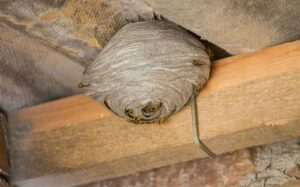
Watching the villain in a movie or cartoon getting swarmed by a horde of angry wasps is highly entertaining. But if you have a wasp nest somewhere on your property, you know that wasps are no joke. Wasp nests are a serious concern for homeowners, and a lot of misinformation surrounds their removal.
Searching the internet for wasp nest removal techniques yields a lot of questionable information that could ultimately harm you or those you love. So, let us at Gilles Lambert Pest Control Services Inc. set the record straight. Wasps are serious pests and you don't want to trust bad advice and end up paying the consequences. Read on to get some accurate background information on wasps as well as reliable advice on when and how to remove their nests - and when it is time to call in the experts.
Well, to put it bluntly, the wasps get mad. Really mad.
Like beehives, wasp nests function as a monarchy. Queen wasps are protected by worker wasps (sometimes thousands of them, in a well-established nest). And when you mess with the nest, their instinct is to protect their monarch with the only weapons they have: Their stingers.
Wasp stings are rated a 3 out of 4 on the Schmidt Sting Pain Index (which ranks insect stings and bites according to how painful they are). And if you get stung on your face, or other sensitive areas, the pain can intensify. Not to mention the excruciating possibility of sustaining multiple stings. Unlike honeybees, wasps can sting multiple times and will actively pursue the being who has threatened their home and queen.
Some people are severely (even life-threateningly) allergic to wasp stings. But even if you're not, multiple wasp stings can still be hazardous to your health - not to mention, very painful.
Wasps are tenacious when it comes to protecting themselves, and they will seek revenge on intruders. If you’re ever in a situation where wasps are swarming, try to get indoors (or even into your car) as quickly as possible. Remove children and pets from the area, cover your head and face if possible, and don't think that jumping into a body of water will protect you. Wasps are smart, and they will wait to sting you when you come up for air.
Once you’re safely indoors, kill and get rid of any wasps that have followed you. Treat wasp stings with ice and pain relief and watch for any concerning signs of reaction such as extreme swelling or difficulty breathing.
Well, the simple answer is yes. But probably not before they've caused a considerable amount of harm. For the reasons mentioned above, knocking down an active wasp nest is never the recommended method of dealing with these pests.
Preferred methods for dealing with wasp nests include early intervention before the nest truly becomes active and removal during the winter season when wasps are inactive.
If you've discovered an active nest, your best option is to call in professional pest control.
Before you have wasp nests removed from your property, it’s important to distinguish them from bee hives. In some places, bees are protected, and removing their hives can actually be punishable. If you have any doubts, the professionals from Gilles Lambert Pest Control Services Inc. can help you identify exactly what you are dealing with, provide answers to your questions, and give advice on how to proceed properly.
No. Wasps build new nests every season and will not return to the same place once a nest has been abandoned - no matter the reason.
It’s worth noting, however, that wasps will return to a partially damaged nest if they have not abandoned it entirely. When dealing with a wasp problem, therefore, it’s important to ensure that the nest in question is completely destroyed in order to thoroughly eradicate wasps from your property. Gilles Lambert Pest Control Services Inc. can help.
If you’re dealing with an active nest in your yard, the answer is an emphatic no. At least not on your own. You should have the wasp nest removed - definitely - but should not attempt to do it by yourself. Even experts with years of experience still sustain stings when getting rid of wasps. Don't put yourself at risk.
The same goes for nests that may be hidden from view. If you suspect that wasps are active inside a wall or in a crevice you can't get a good visual on, never poke the area in hopes of destroying the nest yourself. Wait until the experts arrive to remove the nest professionally.
Routine maintenance of your property can be a proactive strategy in keeping wasp nests in check, especially in protected and hard-to-see areas. Sweep and scan your eaves, rafters, and soffits on a regular basis and seal up holes and other small, dark spaces that might attract wasps and other pests.
In general, yes. Winter is the one time of year when it’s possible to safely knock down a wasp nest.
Worker wasps are short-lived creatures. They are born in the summer months and die off in the autumn. Queen wasps live for many years, but they hibernate during the winter months - often looking for warm, dry places, such as your attic or basement. In other words, wasps effectively abandon their summer nests in winter.
Even in the winter, however, it’s advised to double-check for any wasp action around the nest and to burn or bury the abandoned nest after removal.
Before removing an abandoned nest...double-check that it truly is abandoned!! As mentioned above, nests are usually completely abandoned in the winter.
But in other seasons? Don't be so sure.
In spring, as wasp season begins, queen wasps establish new nests and begin to lay eggs. Paper wasps are the most common, and you can identify their papery abodes hanging like umbrellas from a single stalk as they begin to take shape. A new nest generally hangs beneath a horizontal surface, such as a branch, eave, or roof, and may look relatively harmless.
But don't be fooled. A wasp's nest is filled with eggs and then larvae. And what comes next, of course, are adult wasps themselves. And lots of them! So don't assume a small, quiet nest is abandoned. It may just be full of young wasps at various stages of development.
Likewise, don't assume that a wasp nest is abandoned in the autumn. As the days shorten and the weather gets chillier, wasps start to move more slowly. The worker wasps prepare to die off, and the queen prepares to hibernate.
But slow wasps can still be roused. And you can still get stung! Don't assume that a quiet nest is necessarily empty and safe.
The same logic applies, of course, in the middle of summer. Wasps are usually pretty inactive at dawn and dusk. In fact, this is often a good time for a professional pest controller to deal with a wasp problem. But inactive is not the same as abandoned. In the summertime especially, the only safe assumption about a wasp nest is that it poses a real risk to you.
Even if you’re absolutely certain that a wasp nest is abandoned, you should still take proper precautions when the time comes to get rid of it. An abandoned wasp nest can become a home to other types of pests, like spiders or ants, and can also be difficult to access.
Our advice is to have a professional pest control expert examine any wasp nest on your property before removing it, no matter the season. But at the very least, do your due diligence and observe the nest carefully before attempting to remove it. Also, be sure to use proper tools such as a sturdy ladder and gloves for protection.
Removing a wasp nest professionally involves training, experience, and access to specialized chemicals and tools. Fortunately, all of our certified technicians at Gilles Lambert Pest Control Services Inc. are well versed in wasp removal techniques and can control your wasp problem safely and effectively.
At GL Pest Control, we know that every moment spent with wasps (or other pests) on your property is one moment too long. That’s why we aim for same-day service and why our technicians arrive prepared with everything they need to complete the job.
All of us at Gilles Lambert Pest Control Services Inc. are certified, bonded, and insured in accordance with all of the governing associations (MPMA, CPMA, and NPMA). Beyond that, we are environmentally conscious and committed to excellent service.
The best time to deal with a wasp nest on your property is now. So don't hesitate. Give us a call today and let our experts take the sting out of the situation so you can get back to enjoying summer in your yard.
For more information feel free to get in touch with Gilles Lambert Pest Control at 204-479-6669 right away!
